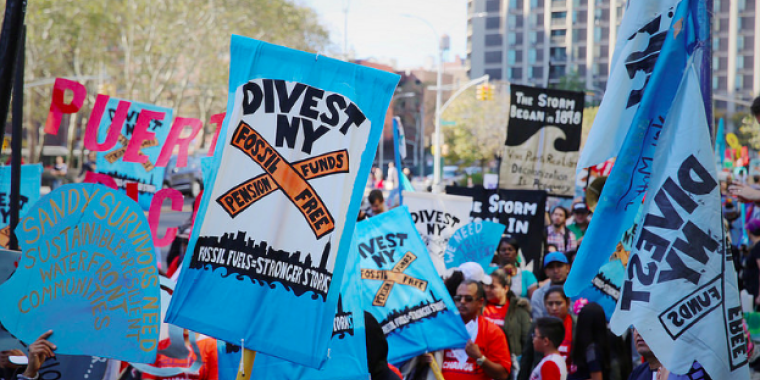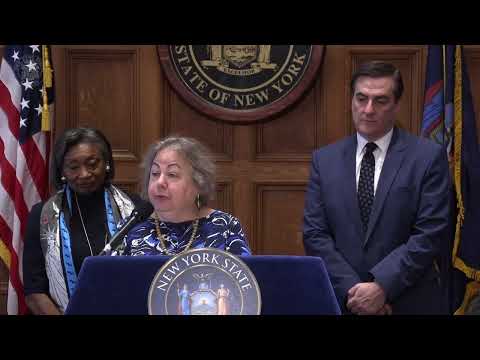
Senators Press State Comptroller On Fossil Fuel Divestment
September 26, 2019

Albany – Today State Senator Liz Krueger, Chair of the Senate Finance Committee, and 11 other Senators released a letter to State Comptroller Thomas P. DiNapoli, urging him to study a fossil fuel divestment scenario as part of the five-yearly asset allocation review for the Common Retirement Fund that his office is currently engaged in. The letter from the Senators, all co-sponsors of the Fossil Fuel Divestment Act (S.2126), can be viewed here and is reprinted below.
"The climate crisis is here – fiduciary and moral responsibility require the process of divestment to begin now," said Senator Krueger. "The writing on the wall could not be clearer: fossil fuel producers are a bad long-term investment. Divestment will protect workers and retirees from the rapid devaluation these companies will suffer in the coming energy transition. Though the Comptroller continues to resist calls for divestment, I urge him nonetheless to use the asset allocation review process to begin preparing for the inevitable.”
As trustee of the Common Retirement Fund, the Comptroller is required to review and establish an asset allocation plan at least once every five years (see General Investment Policies for the New York State Common Retirement Fund, pg. 14). The plan is informed by an asset allocation study performed by an outside consultant, which the Comptroller has said is being developed now. In their letter, the Senators urge the Comptroller, "to include in the scope of work for the consultants performing the asset allocation study a scenario for a fund portfolio that includes divestment from fossil fuel producers within the next five years."
A recent report from Carbon Tracker revealed that no major oil company is making capital investments that align with the goals of the Paris Agreement to keep global warming below 2°C, let alone the now broadly accepted goal of 1.5°C. In their letter, the Senators argue that such a misallocation of funds creates significant stranded asset risk for the companies, and therefore unacceptable long-term risk for the pension fund. The letter quotes the recent report from the Decarbonization Advisory Panel, jointly appointed by the Comptroller and Governor Andrew M. Cuomo, which stated that, "being too early in the avoidance of the risk of permanent loss is much less of a danger than being too late.”
"Climate change is real, ever growing and the State of New York needs to remain ahead of it," said Senator Jamaal Bailey. "As we continue to make the necessary shift from fossil fuels to clean energy, we must ensure that New York State's retirement funds are being properly invested with an outlook on future impacts. We hope the State Comptroller takes this into consideration in his upcoming study on the Common Retirement Fund's asset allocation policy with an eye towards future divestment.”
"To combat climate change, New York State must end it's financial investment in industries or projects that directly produce environmental threats," said Senator Alessandra Biaggi. "I firmly support the Fossil Fuel Divestment Act, and stand with my colleagues in demanding that New Yorkers' pensions are not tied to companies risking the health and safety of our planet. I encourage New York State Comptroller Thomas P. DiNapoli not to shy away from this issue, and include an analysis of the potential impacts of fossil fuel divestment in the asset allocation study that will be used to inform his current review of the Common Retirement Fund’s asset allocation policy."
"The United Nations estimates we have only eleven years left before our planet hits a major climate tipping point," said Senator Brad Hoylman. "New York needs to use every tool at its disposal in response. The New York State Common Retirement Fund controls more than $200 billion in assets and is the third largest state retirement fund in the nation, but it is still invested in fossil fuels. It's absurd that we're asking young New Yorkers to sacrifice their futures and the future of our planet in order to finance our retirements, especially when many feasible alternative investments exist. I am proud to stand with Senator Krueger and my elected colleagues to push for a responsible and quick divestment. There is no time to waste."
"It’s important that our state pension system divest over the next five years from fossil fuel investments which are risky, volatile and have shrinking, short-term benefits," said Senator Jen Metzger. "We must instead look to markets, like renewable energy, that are growing and have a long future ahead. I have every confidence that the Comptroller and his team can develop a plan to do so with minimal risk and great potential benefits to our state retirement fund."
###
BACKGROUND:
The Fossil Fuel Divestment Act (S.2126/A.1536), which has 28 co-sponsors in the Senate, would require the State Comptroller to divest the New York State Common Retirement Fund from all holdings in the 200 largest publicly traded fossil fuel companies, as defined by carbon content in the companies’ proven oil, gas, and coal reserves (the CU 200). Divestment from coal companies would be completed within one year; divestment from all other fossil fuel companies would be completed within five years. Currently, ExxonMobil represents the largest single CU200 holding in the CRF, with around $1 billion invested.
On April 30th, a public hearing was held in Albany on the issue of divestment. Video of the hearing, as well as copies of written testimony, are available here.
Worldwide there are currently 1,118 institutions that have committed to divest, including universities, faith-based organizations, non-profits, municipalities, philanthropic organizations, and national and state pension funds, controlling $11.48 trillion in assets. In 2018, Ireland became the world's first nation to fully divest its $10.4 billion sovereign wealth fund from fossil fuels.
The list of institutions involved in the divestment movement includes the Teachers Retirement System of the City of New York, New York City Employees Retirement System, California Public Employees' Retirement System (CalPERS), California State Teacher's Retirement System; Pratt Institute, Union Theological Seminary of New York City, The New School, and Stanford and Syracuse Universities; the cities of Seattle, San Francisco, Portland, Minneapolis, and Ithaca; the World Council of Churches, and the United Methodist Church USA; Guardian Media Group, the Rockefeller Brothers and Family Funds, The Blumenthal Foundation, and the sovereign wealth fund of Norway. A full list of divestment commitments can be viewed here.
Supporters of divestment argue not only that it is no longer acceptable to financially support the extraction of climate-destabilizing fossil fuels, but also that the state pension fund is exposed to increasing financial risk by holding onto fossil fuel companies, which stand to lose significant value as the world acts to mitigate climate change. The impact of the clean-energy transition is already being felt by these companies, and the economics of renewable energy continues to develop in such a way as to threaten the hegemony of fossil fuels regardless of the actions taken by governments. The Common Retirement Fund has already lost more than $260 million in coal investments since 2010; a recent study by Corporate Knights estimated that the Fund is valued at $22.2 billion less than it would have been had it divested from fossil fuels in 2008 and redistributed those funds across the rest of the portfolio.
The global divestment movement is having an impact on fossil fuel producers, in part through the process of stigmatization, which can damage enterprise value by discouraging engagement by business partners, employees, lenders, governments, politicians, etc, as well as leading to restrictive legislation. The increased scrutiny tar sands have received as a result of divestment and allied stigmatization campaigns was a contributing factor to Exxon’s decision to write down the value of its tar sands reserves. Peabody Energy, a coal producer that went bankrupt in 2016, said of the divestment movement: “the impact of such efforts may adversely affect the demand for and price of securities issued by us, and impact our access to the capital and financial markets.” Shell now cites divestment as a major material risk to its current business model, which could lead to project delays or cancellations and could affect its ability to access capital. The Common Retirement Fund has invested $2.7 million in Peabody Energy, $133 million in Shell, and over $1 billion in Exxon.
related legislation
Share this Article or Press Release
Newsroom
Go to Newsroom
The Impact of Casinos on Urban Communities
February 23, 2024

An Open Letter From Jewish Elected Officials Regarding The War In Gaza
February 20, 2024

